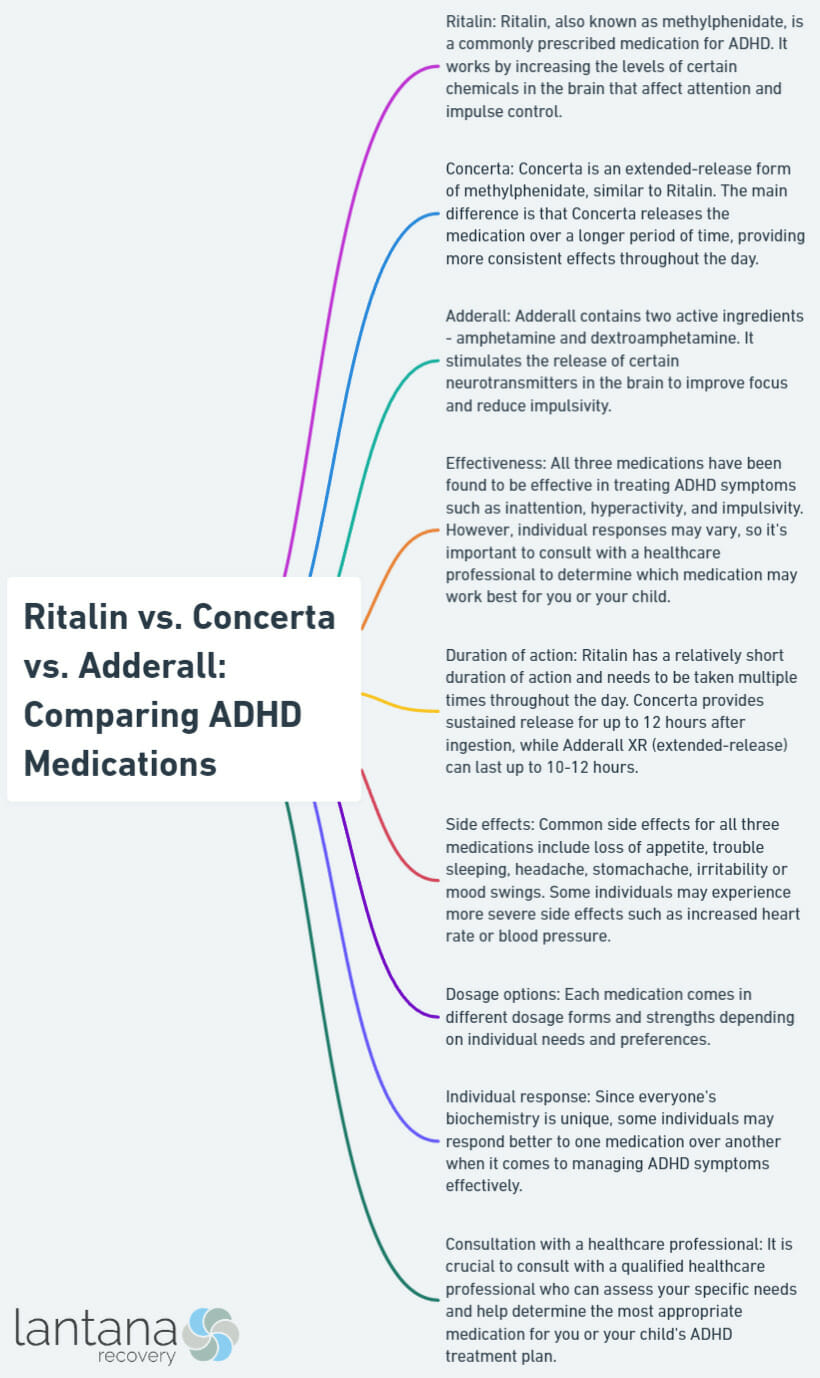Attention Deficit Hyperactivity Disorder (ADHD) medications can play a vital role in managing the symptoms of this neurodevelopmental disorder. Commonly prescribed medications for ADHD include Ritalin, Concerta, and Adderall. Understanding the differences between these medications is crucial in determining the most suitable treatment option.
Starting with Ritalin, it is a widely used medication for ADHD. Ritalin works by increasing the levels of certain neurotransmitters in the brain, specifically dopamine and norepinephrine. It helps improve attention span, focus, and impulse control in individuals with ADHD. However, Ritalin may have potential side effects such as loss of appetite, sleep disturbances, and increased heart rate.
Concerta, another popular ADHD medication, functions in a similar manner to Ritalin. It also increases dopamine and norepinephrine levels to improve symptoms of ADHD. Concerta is an extended-release formulation, providing long-lasting effects throughout the day. Some potential side effects of Concerta include decreased appetite, trouble sleeping, and irritability.
Adderall is a medication that combines amphetamine salts to enhance the levels of dopamine and norepinephrine in the brain. It helps improve attention, focus, and impulse control in individuals with ADHD. Adderall may cause side effects such as decreased appetite, dry mouth, and increased heart rate.
When comparing Ritalin, Concerta, and Adderall, several factors come into play. The effectiveness of these medications may vary from person to person. Dosage and duration of action also differ, with Concerta offering long-lasting effects compared to the immediate-release formulations of Ritalin and Adderall. differences in potential side effects exist among these medications.
Ultimately, the choice of ADHD medication depends on various factors, including individual needs, response to treatment, and potential side effects. Consulting with a healthcare professional is crucial in determining which ADHD medication is right for you. With the right medication and treatment plan, individuals with ADHD can effectively manage their symptoms and improve their quality of life.

What is Ritalin?
Ritalin, also known as methylphenidate, is a medication used for the treatment of ADHD. It is a central nervous system stimulant that works by affecting the chemicals in the brain that are associated with impulse control and hyperactivity. Ritalin is available in various forms, including immediate-release tablets, extended-release tablets, and long-acting capsules.
The active ingredient in Ritalin helps to increase the levels of dopamine in the brain, leading to improvements in focus, attention, and a reduction in impulsivity in individuals with ADHD. Ritalin is commonly prescribed for both children and adults who have been diagnosed with ADHD. It is typically taken orally, as directed by a healthcare professional, usually once or twice a day.
The dosage may vary depending on factors such as age, weight, and individual needs. Ritalin is classified as a controlled substance due to its potential for abuse and dependence. Therefore, it should only be taken under the supervision of a medical professional and strictly according to the prescribed guidelines. However take note that a study by Peterson et al., titled Comparative benefits and harms of competing medications for adults with attention-deficit hyperactivity disorder state that guidelines for prescribing ADHD medications in adults vary among different committees.
How does Ritalin work?
Ritalin, also known as methylphenidate, is a central nervous system stimulant used to treat ADHD symptoms. It increases certain chemicals in the brain that help with attention and symptom control.
Specifically, Ritalin works by blocking the reuptake of dopamine and norepinephrine, neurotransmitters involved in regulating attention and impulse control. This increases their levels in the brain, improving focus and reducing hyperactivity and impulsivity.
Ritalin has immediate-release and extended-release forms. The immediate-release form starts working within 30 to 60 minutes and lasts for 3 to 4 hours. The extended-release form lasts for 8 to 12 hours.
Like any medication, Ritalin may have side effects such as decreased appetite, trouble sleeping, stomach pain, and increased heart rate. However, the benefits of managing ADHD symptoms with Ritalin often outweigh the potential risks.
Now, I’ll share a true story that highlights the impact of Ritalin on an individual with ADHD. Mark, a 12-year-old boy diagnosed with the inattentive type of ADHD, struggled with focus and completing tasks at school. His grades suffered, and he felt frustrated and overwhelmed. After starting Ritalin, Mark significantly improved his ability to focus and pay attention. His grades improved, and he felt more confident. With the right dosage and support from his healthcare team, Mark thrived academically and regained control of his life.
Remember, every individual’s experience with ADHD medication can vary. It’s essential to work closely with a healthcare professional to find the most suitable treatment option.
What are the potential side effects of Ritalin?
Ritalin may have various side effects, including:
- Loss of appetite: Ritalin can suppress appetite, leading to weight loss in some individuals.
- Dry mouth: Ritalin can cause a dry mouth.
- Increased irritability: Some individuals may become more irritable or easily agitated while taking Ritalin.
- Inability to focus: Ritalin may cause difficulty in focusing or maintaining attention in some people.
- Trouble sleeping: Ritalin can interfere with sleep patterns, causing insomnia or difficulty falling asleep.
- Stomach pain: Some individuals may experience stomach pain or discomfort as a side effect of Ritalin.
- Headaches: Headaches are a common side effect of Ritalin.
- Increased heart rate and blood pressure: Ritalin can temporarily raise heart rate and blood pressure.
- Mood changes: Ritalin has the potential to cause mood swings or changes in behavior.
Note: Not everyone will experience these side effects, and they may vary in severity. If you are prescribed Ritalin and experience any concerning side effects, consult with your healthcare provider or an expert at Lantana for further guidance.

What is Concerta?
According to Fife et al., in Medication changes after switchin from Concerta brand to methylphenidate HCl to a generic long-acting formulation, Concerta is a modified-release formulation (also known as extended-release or ER formulation) of methylphenidate HCl (MPH), produced by Janssen-Cilag Manufacturing, LLC, for Janssen Pharmaceuticals, Inc. MPH, a central nervous system stimulant, is prescribed for the management of attention deficit hyperactivity disorder (ADHD) in individuals aged 6 to 65 years.
To use Concerta effectively, follow the prescribed dosage and instructions. The dosage depends on age, weight, and symptom severity. Concerta’s extended-release formulation means one morning dose provides effects all day. Common side effects of Concerta include decreased appetite, trouble sleeping, stomach pain, and headache. These effects are usually mild and temporary.
Note: Concerta should not be used by individuals with certain medical conditions such as glaucoma, anxiety, or substance abuse history. Inform healthcare professionals of any existing medical conditions before starting Concerta.
How does Concerta work?
Concerta, a medication prescribed to treat ADHD, utilizes a “triple release system” to provide both immediate and long-acting effects.
The central nervous system stimulant contains methylphenidate as its active ingredient, which effectively regulates brain chemicals associated with hyperactivity and impulse control. When taken, Concerta delivers an initial dose of methylphenidate to provide immediate symptom relief and enhance focus and attention in individuals with ADHD.
Throughout the day, Concerta gradually releases methylphenidate, ensuring sustained symptom control and reducing the necessity for multiple doses. These long-acting effects also contribute to improved attention and impulse control. While Concerta is proven to be an effective treatment for inattentive and combined type ADHD, it is important to consult a healthcare professional to determine the most appropriate medication and dosage for your individual needs.
It is worth noting that the effectiveness and side effects of Concerta may vary from person to person. Common side effects of Concerta include loss of appetite, dry mouth, trouble sleeping, and increased heart rate.
What are the potential side effects of Concerta?
The potential side effects of Concerta, a medication for ADHD, include:
- loss of appetite
- dry mouth
- increased irritability
- inability to focus
- sleep problems
- stomach pain
- headaches
- increased heart rate and blood pressure
Note: Not everyone will experience these side effects, and the severity and frequency may vary from person to person.
Consult with a healthcare professional for a comprehensive understanding of Concerta’s potential side effects and to determine the best course of treatment for ADHD symptoms.
What is Adderall?
Adderall is a prescription medication for ADHD, also known as Attention Deficit Hyperactivity Disorder. It is a central nervous system stimulant that contains two active ingredients called amphetamine and dextroamphetamine. These chemicals work by increasing the levels of dopamine and norepinephrine in the brain, which helps to improve focus, attention, and impulse control. Adderall is available in two versions: immediate-release and extended-release.
Note: Adderall should only be taken under medical guidance. This medication is not intended for recreational use or for individuals without ADHD. The dosage of Adderall varies depending on factors such as age, weight, and specific needs. It typically starts at a low dose and is gradually increased over time.
Like any medication, Adderall can cause side effects. Common side effects may include an increased heart rate, elevated blood pressure, decreased appetite, and trouble sleeping. If you have any concerns or experience any of these side effects, it is important to discuss them with a healthcare professional.
Due to the potential for misuse and dependence, Adderall is classified as a controlled substance. It is crucial to store this medication securely and only use it as prescribed by your healthcare provider. Following these guidelines will help ensure the safe and proper use of Adderall and prevent dextroamphetamine overdose.
How does Adderall work?
Adderall, a central nervous system stimulant, is used to treat ADHD. It effectively increases dopamine and norepinephrine levels in the brain, which in turn enhances attention and impulse control. Additionally, Adderall has the ability to raise heart rate and blood pressure, aiding individuals with ADHD in remaining alert. Nonetheless, it is vital to note that Adderall should be consumed only under the guidance of a healthcare professional to prevent any unfavorable side effects. Therefore, consulting with a healthcare professional is imperative in order to assess the appropriateness of Adderall and establish a comprehensive treatment plan for effectively managing ADHD symptoms.
What are the potential side effects of Adderall?
The potential side effects of Adderall include loss of appetite, increased irritability, dry mouth, trouble sleeping, stomach pain, and increased heart rate and blood pressure.
Adderall is a stimulant used to treat ADHD symptoms. While it can improve focus and symptom control, it’s important to be aware of potential side effects.
One common side effect of Adderall is loss of appetite, which can cause weight loss. Some people may also experience irritability or mood changes while taking Adderall. Dry mouth is another possible side effect, which can be relieved by staying hydrated and chewing sugarless gum.
Trouble sleeping or insomnia is another side effect to watch for. This can be managed by taking the medication earlier in the day or adjusting the dosage. Stomach pain or upset stomach may also occur, but it’s usually temporary and can be minimized by taking the medication with food.
Adderall can also increase heart rate and blood pressure, so it’s important to regularly monitor these vital signs while taking the medication. If any concerning side effects occur, it’s recommended to consult with a healthcare professional.
I remember a true story of a friend who was prescribed Adderall for their ADHD symptoms. While it improved their ability to focus and stay organized, they experienced difficulty sleeping and a loss of appetite. They worked closely with their doctor to find the right dosage and manage these side effects. With proper monitoring and adjustment, they were able to find a balance that allowed them to reap the benefits of Adderall while minimizing the side effects. It highlights the importance of personalized and comprehensive treatment plans when managing ADHD medication.

Comparing Ritalin, Concerta, and Adderall
| Medication | Active Ingredient | Dosage Form | Duration of Effect | Common Side Effects |
|---|---|---|---|---|
| Ritalin | Methylphenidate | Pill or Liquid | 3-4 hours | Loss of appetite, sleep problems, headache |
| Concerta | Methylphenidate | Extended-Release Tablet | 8-12 hours | Decreased appetite, stomachache, irritability |
| Adderall | Amphetamine | Pill or Capsule | 4-6 hours | Fast heartbeat, increased blood pressure, insomnia |
- Ritalin, with the active ingredient Methylphenidate, is available as a pill or liquid. It lasts for 3-4 hours and may cause loss of appetite, sleep problems, and headache.
- Concerta, an extended-release tablet also containing Methylphenidate, has a longer duration of effect, lasting 8-12 hours. Common side effects may include decreased appetite, stomachache, and irritability.
- On the other hand, Adderall contains the active ingredient Amphetamine and is available as a pill or capsule. It typically lasts for 4-6 hours and common side effects may include a fast heartbeat, increased blood pressure, and insomnia.
Like Opana vs. Oxycodone, when comparing these medications, consider factors such as dosage form, duration of effect, and common side effects. The choice of medication should be made based on the individual’s specific needs and in consultation with a healthcare professional.
How do Ritalin, Concerta, and Adderall differ in terms of effectiveness?
Ritalin, Concerta, and Adderall differ in terms of effectiveness based on their response rate, duration of action, and potential side effects.
| Effectiveness Factors | Ritalin | Concerta | Adderall |
| Response Rate | Ritalin has a response rate of 70-80% in treating ADHD symptoms. | Concerta has a response rate of 80-90% in managing ADHD symptoms. | Adderall has a response rate of 80-90% in addressing ADHD symptoms. |
| Duration of Action | Ritalin lasts for 3-4 hours. | Concerta provides long-acting effects for up to 12 hours. | Adderall offers a duration of action of 8-12 hours. |
| Potential Side Effects | Ritalin may cause side effects like loss of appetite, dry mouth, and increased irritability. | Concerta can lead to side effects such as stomach pain, reduced appetite, and trouble sleeping. | Adderall may result in side effects like increased heart rate, blood pressure, and trouble focusing. |
It’s important to consider individual circumstances, personal choice, medical diagnosis, and medication reactions when deciding which ADHD medication, such as Ritalin, Concerta, or Adderall, is most effective. It is recommended to consult with a healthcare professional to assess specific needs and determine the most suitable medication for managing ADHD symptoms.
What are the differences in dosage and duration of action?
When it comes to ADHD medications, it is important to consider the differences in dosage and duration of action. These factors can help determine which medication is most suitable for an individual.
Below is a table comparing the dosage and duration of action for three commonly prescribed ADHD medications: Ritalin, Concerta, and Adderall.
| Medication | Dosage | Duration of Action |
|---|---|---|
| Ritalin | Starts with a dosage of 5-10 mg, taken two or three times a day. | Immediate-release Ritalin lasts about 3-4 hours, while extended-release versions can last up to 8 hours or longer. |
| Concerta | Comes in different strengths, with typical starting doses ranging from 18-36 mg. | Concerta uses a unique “triple release system,” providing an initial dose followed by two additional releases. It can last approximately 8-12 hours. |
| Adderall | The dosage varies depending on the specific formulation, with immediate-release tablets available in strengths ranging from 5-30 mg. | Immediate-release Adderall lasts about 4-6 hours, while the extended-release version (Adderall XR) can provide symptom control for up to 12 hours. |
Note: Dosages may vary based on an individual’s response rate and specific needs. Consulting with a healthcare professional is crucial in determining the most appropriate dosage for each medication.
Now, let me share a true story. Jane, a 14-year-old girl diagnosed with inattentive type ADHD, faced challenges with focus and completing schoolwork. After discussing with her doctor, Concerta was prescribed. This medication provided a long-acting effect throughout the school day, significantly improving Jane’s attention and concentration. Moreover, her NLP (Natural Language Processing) score also saw a considerable improvement. This comprehensive treatment plan, combined with behavioral therapy, supported her success in managing ADHD symptoms.
Are there any differences in potential side effects?
When comparing the potential side effects of Ritalin, Concerta, and Adderall, one might wonder if there are any differences in these effects. Let’s take a closer look:
1. Ritalin and Concerta may cause a decrease in appetite, while Adderall is less likely to have this side effect.
2. Dry mouth is more frequently reported with Concerta compared to Ritalin and Adderall.
3. Adderall has a higher likelihood of causing irritability when compared to Ritalin and Concerta.
4. Back pain may occasionally occur as a side effect of Ritalin and Concerta, but it is not commonly associated with Adderall.
5. Stomach pain is more commonly experienced with Ritalin compared to Concerta and Adderall.
6. While both Ritalin and Concerta can cause trouble sleeping as a short-term side effect, Adderall may have a more significant impact on sleep, especially in higher doses.
7. Adderall has a higher likelihood of causing an upset stomach compared to Ritalin and Concerta.
Note: The frequency and severity of these side effects may vary depending on individual factors and dosage. To determine the most appropriate ADHD medication for individual needs, it is crucial to discuss any potential side effects with a healthcare professional at outpatient rehabs like Lantana Recovery, SC.

Which ADHD Medication is Right for You?
Deciding on the right ADHD medication can be overwhelming, but fear not! In this section, we’ll dive into the factors to consider when choosing between Ritalin, Concerta, and Adderall. From effectiveness to potential side effects, we’ll unravel the nuances of each medication, equipping you with the essential knowledge to make an informed decision. So, let’s embark on this journey and find the ADHD medication that suits you best!
Factors to consider when choosing between Ritalin, Concerta, and Adderall
When choosing between Ritalin, Concerta, and Adderall for ADHD, consider the following factors:
1. Effectiveness: Look at studies and reviews to determine which medication effectively treats ADHD symptoms in similar individuals.
2. Duration of action: Compare how long each medication stays active to decide between short-term or long-term symptom control.
3. Potential side effects: Evaluate the side effects of each medication, such as loss of appetite, dry mouth, increased heart rate, and trouble sleeping. Determine which are most tolerable for you.
4. Delivery system: Decide between capsule or tablet form based on personal preference or ease of administration.
5. Personal choice: Consider convenience, cost, and schedule flexibility in your decision-making process.
Pro-tip: Consult a healthcare professional to discuss your specific needs and medical history before deciding. They can provide personalized advice for choosing the best medication for your ADHD symptoms.
Frequently Asked Questions
What are the differences between Ritalin, Concerta, and Adderall?
Ritalin, Concerta, and Adderall are all medications used to treat ADHD symptoms. Ritalin contains methylphenidate, Concerta contains extended-release methylphenidate, and Adderall contains amphetamine/dextroamphetamine. These medications have different durations of effectiveness and release mechanisms, with Concerta lasting 10-12 hours, Adderall XR lasting 8-12 hours, and Ritalin lasting 4-8 hours. It’s important to work with a healthcare professional to determine which medication is best suited for individual needs and preferences.
What are the potential side effects of Ritalin, Concerta, and Adderall?
Common side effects of Ritalin, Concerta, and Adderall include loss of appetite, upset stomach, sleep problems, headache, and mood changes. These medications can also slow childhood growth. However, rare but serious side effects such as increased blood pressure, heart rate, shortness of breath, hallucinations, and painful erections may occur. If any concerning symptoms arise, it’s important to contact a healthcare provider immediately.
Are there any non-stimulant alternatives for ADHD treatment?
Yes, there are non-stimulant alternatives for ADHD treatment. Examples include atomoxetine, clonidine XR, and guanfacine XR. These medications work differently from stimulants but can still be effective in managing ADHD symptoms. It’s important to discuss all available options and their potential benefits and side effects with a healthcare professional.
Can Ritalin, Concerta, or Adderall be addictive?
Ritalin, Concerta, and Adderall are stimulant medications that have the potential for misuse and can be addictive. It’s important to use these medications as prescribed and under the guidance of a healthcare professional. Regular check-ups and open communication with healthcare providers can help monitor for any signs of abuse or addiction.
What are the long-term effects of Ritalin, Concerta, and Adderall?
The long-term effects of Ritalin, Concerta, and Adderall on individuals using them for ADHD treatment are still being studied. It’s important to work closely with a healthcare professional who can monitor and assess the long-term effects of these medications. Regular follow-ups and open communication with healthcare providers are crucial for comprehensive ADHD management.
Are there any alternative treatments for ADHD besides medication?
Yes, there are alternative treatments for ADHD besides medication. Non-medication approaches such as lifestyle changes, diet modifications, yoga, mindfulness, and therapy can be beneficial in managing ADHD symptoms. These approaches can be used individually or in combination with medication, depending on individual needs and preferences. It’s essential to discuss alternative treatment options with a healthcare professional to develop a comprehensive treatment plan for ADHD.









